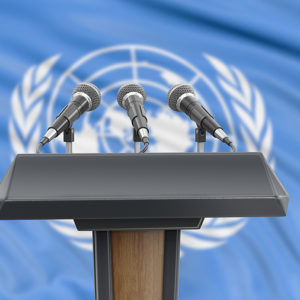Who decides what you hear about climate change? The United Nations wants to be the arbiter of what you are told is “true” on this crucial issue. The more that we examine this proposition, the scarier the concept gets.
The UN has launched a global initiative called the “Global Initiative for Information Integrity on Climate Change” designed to promote the publication of “verified” climate change information by media outlets and on social media. This move comes just when social media companies like Meta are reversing their years-long policy of “fact-checking” climate change policy debate—which Meta admits resulted in censorship.
But it gets worse. The UN’s goal is not to highlight basic things like the broad scientific consensus that climate change is real. No, its intention is to “boost support for urgent climate action.” What this translates to is the UN using its global might to push for policies like sweeping new climate taxes, along with a race to net-zero, extremist, economy-punishing policies, wealthy countries paying poor countries huge sums for climate reparations, and ending fossil fuels entirely within 25 years.
Already, the UN has started setting out its supposed “facts on climate”—and these show even more reason for concern. One such “fact” is the contention that climate change is a major threat to human health because fossil fuel-caused air pollution causes some 8.7 million deaths a year. Bizarrely, this figure is more than twice what the UN’s own World Health Organization estimates. In misstating the threat to life, the UN ignores the fact that deaths from climate-related catastrophes have declined 97.5% over the past century—and that far more people die from cold than heat. And in focusing on air pollution, the UN deliberately confuses climate policy which cuts CO₂ with the real solution, which is using scrubbers on smokestacks and catalytic converters on cars to cut air pollution.
Another “fact” the UN is promoting: the idea that sea level rise could submerge small islands like Kiribati. This claim is often repeated by activists, but that doesn’t make it true: even the New York Times acknowledges the vast scientific literature showing Kiribati and almost every atoll is stable or increasing in size.
The UN also claims, wrongly, that “solar panels and wind turbines make good use of land” (in reality, solar and wind are some of the most land-intensive energy forms) and that the transition to clean energy will create millions of jobs. The latter is an economically illiterate mistruth: in the US, solar employs 35 workers to produce the same amount of energy that one natural gas worker can produce, meaning natural gas is much more efficient because 34 workers can be freed to do other important work, increasing social welfare.
And the UN repeats the oft-told lie that renewables are cheaper than fossil fuels. They gloss over this mistruth by measuring the cost only when the sun is shining or the wind blowing, ignoring the costs of intermittency and unreliability. The fact is, no country with significant solar and wind has low electricity costs — indeed, on average, electricity costs are two or three times higher than for countries with little solar and wind.
All this can only be described as propaganda. The fact is that there are complex, important, and ongoing debates taking place among climate scientists and economists. The UN would pretend no such uncertainty exists on issues like how much the world would warm from a doubling of CO₂. And it would entirely ignore the contributions from climate economists that show that most of the “urgent climate action” policies do little for the climate at great cost.
An example of what it would likely call “disinformation”: the most recent research on the costs and benefits of net-zero climate policies that shows average annual benefits of $4.5 trillion over the 21st century and much larger costs of $27 trillion per year.
What this means is that the UN is actively trying to shut down debate and promote just one policy approach. Consider if it did the same thing on the migration debate, picking one extreme policy position of completely open (or closed) borders everywhere, and declared that anything not aligned with this policy was wrong.
The notion that US taxpayers should spend hundreds of trillions of dollars on poor climate policies is surely worth discussion and debate.
Especially as it comes under a microscope from the Trump Administration, the UN should think twice about trying to suppress discussion. The UN and other multilateral organizations need to return to their roots of helping humanity to navigate the world for peace and prosperity. Now is the time to sharpen the focus on peace and prosperity through sound, data-based advice.

